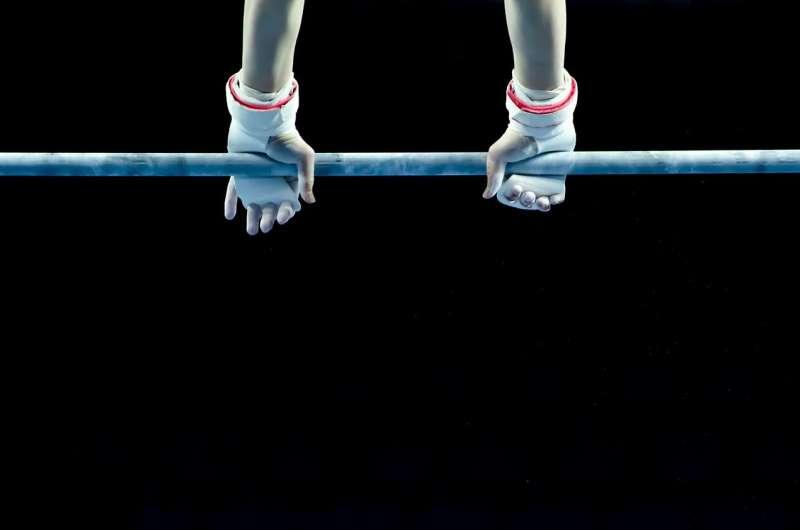This article has been reviewed according to Science X's editorial process and policies. Editors have highlighted the following attributes while ensuring the content's credibility:
fact-checked
trusted source
written by researcher(s)
proofread
British Gymnastics' new rules on weighing athletes—a sticking plaster solution

On November 29 2023, British Gymnastics (BG) released a new policy banning coaches from weighing gymnasts. The governing body's CEO, Sarah Powell, described the new rule as a "significant and positive step forward for the sport."
Yet, when reading the policy in more detail, it seems like a light-touch response to an independent review that concluded BG "condoned" the emotional and physical abuse of gymnasts.
In 2020, the Netflix documentary Athlete A exposed a culture of normalized abuse among coaches in US gymnastics. This led to several British gymnasts sharing their own stories of abuse. For example, former Olympian and Commonwealth Games medallist Lisa Mason said she was made to train until her hand bled and coaches poured surgical spirit on her hands.
Coaches also put artificial turf under the bar apparatus so her feet burnt if they touched the ground, she said. Francesca Fox, who competed in rhythmic gymnastics at the London 2012 Olympic Games, said she was told she "looked like a hippo."
Their stories showed how this behavior was normalized in gymnastics culture.
In 2022, the Whyte review, an independent review into allegations of mistreatment of British gymnasts, was released. It highlighted a culture of "catastrophic safeguarding failings" including training on serious injuries, shaming athletes for their weight, a poor complaints handling system and physical and emotional abuse, and bullying.
Complaints were made about coaches refusing to allow gymnasts to drink water or use the toilet during long training sessions, using their body weight to force children into deeper stretches and searching their possessions for food.
Scratching the surface
At first glance, the new policy may seem an appropriate response to the persistent problem of overweighing, in particular, elite female gymnasts. The Whyte review described this culture as the "tyranny of the scales". But the more closely you look, the more questions surface.
The policy allows sport science practitioners and doctors to weigh gymnasts, and those aged 11 and over can self-report their weight in a gymnastics setting. It says, "The weighing of gymnasts must only be undertaken with the gymnast's optimal long-term development in mind and with clear, scientifically valid rationale."
But can an 11-year-old athlete meaningfully consent? Research looking into children's participation in sport highlighted how "children are more likely to express dissent through non-verbal body language which may be less easily heard."
It's hard to see a scientific reason for weighing athletes. Research has shown that restricted calorie intake is associated with delayed maturation process, greater propensity for micro fractures and a weaker immune system.
There is a misconception that lighter gymnasts give better performances, but research on body composition and performance is unclear. Previous studies have suggested that a lower body mass index is linked to an increase in performance, but performance is negatively affected when body mass index is too low.
The policy is also clear that "coaches must not weigh gymnasts. Gymnasts can choose to self-report their weight." This ignores the power imbalance in the coach-athlete relationship. For example, coaches have sometimes withheld access to food or water.
Former elite gymnasts who took part in interviews for a 2022 study on the long-term psychological effects of maltreatment during their gymnastics career talked about how they were made feel ashamed of their bodies. One gymnast said, "My coach would call me fat in the gym or call me the 'big girl.'" Some former gymnasts in the study were still struggling with anorexia, depression and post-traumatic stress 20 years after retiring.
A 2023 survey of 769 UK female athletes found 91% of respondents worried about how many calories they had eaten.
You don't need to weigh an athlete to control their weight.
Can we really change the culture?
Will gymnasts be any safer? On balance, we don't believe so.
Setting new policies demonstrates a degree of leadership by BG. It also announced two new policies on hydration and athlete education, stating gymnasts must have access to drinks and toilet breaks whenever they need them and should only miss school in exceptional circumstances.
But we remain unconvinced that minor tweaking or updating welfare policies will lead to cultural change.
Just because a policy exists, it does not mean that people will implement it. Enforcing it will cost a lot of money. Coaches who have been in the sport for decades and won many medals may feel they know best and ignore the policy. US gymnastics coach Bela Karolyi reveled in his reputation as a tyrant.
A spokesman for BG said, "We have consistently said that changing culture is a significant undertaking—no one thing on its own will achieve that, and that's why the policies are just one part of much wider reform activity that is being implemented."
We found through our research that gymnasts live in a hard reality, closed off from the outside. We found the culture is reluctant to take in scientific advances in sport psychology, injury and nutrition. Instead, gymnastics culture thrives on the mantra: if it works this way, why should I change?
Except that it did not work—it broke athletes. To move forward, BG should recognize its history and make sure it is faithfully portrayed.
Instead of recording videos with appealing visuals, they should dedicate a page on their website to the stories of survivors. Gymnasts went to great lengths on social media to produce their testimonies. Let's listen. It might be a less pretty way to go about the situation, but it would be a more realistic and powerful step towards a change of culture.
This article is republished from The Conversation under a Creative Commons license. Read the original article.![]()




















